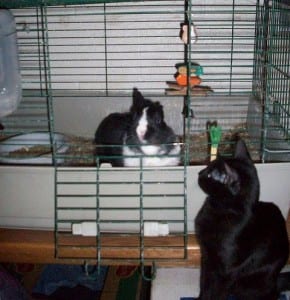Watership Down is Richard Adams’ best-selling novel about a group of wild rabbits forced to abandon their warren and travel across England in search of a new home. Along their journey they encounter a group of caged rabbits–pets of a young boy. Opening the cage door, the wild rabbits invite the boy’s pets to join them on their cross-country adventure. “Who will protect us from the big dog?” they asked, moving to the back of their cage. “And, how will we get food; the little boy always feeds us?” The wild rabbits’ answer was much like Col. Hogan’s answer to Sgt. Schultz’ question in Hogan’s Heroes: “Colonel, why do you keep trying to escape when we treat you so well?”
New employees (and some not so new) often struggle with the internal conflict faced by the caged rabbits. There is the lure of security that comes with conformity, compliance and obedience. There is also the exciting appeal of being irreverent, countercultural, and a bit of a freethinking maverick. And, the longer employees remain in the security world, the graver the perceived consequences for being a nonconformist.
Under the thumb of a controlling leader, most employees acquiesce, walk the straight and narrow, and never rock the boat. Those under the guidance of a benevolent shepherd avoid rebellious behavior out of their guilt-driven allegiance to their loving leader who works so hard to take good care them—like the little boy to the rabbits. However, as Col. Hogan demonstrated, compassionate control is still control.
Leaders of innovation leave the door open and invite employees to come out of the cage to explore, experiment, and take risks. They lead by example, not by fiat or power. They serve. Their governance comes from a strong and obvious allegiance to a set of values and a compelling mission, much like the rabbits on their journey. They invite dissent and encourage the challenging of traditions or “the way we do things around here” practices. They celebrate smart errors and affirm mistakes that come out of the pursuit of excellence. And, they select people who are independent thinkers not submissive soldiers.
Leaders of innovation know that leading as a partner not as a parent will more likely yield ingenuity and invention. And, they know the “big dog” called “the competition” can best be addressed by a band of people bound by a common purpose and free to use all their talents. Consider this: if all your followers were independently wealthy full-time volunteers, how would your leadership practices change?
